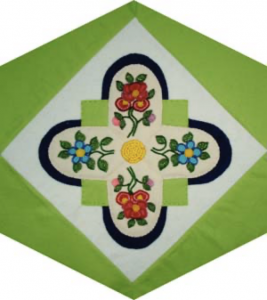Yellowknives

The Block
As a child, Carol Mackenzie (of the Yellowknives Dene First Nation) learned the traditional skill of beadwork from her mother. For this block she contributed two pairs of exquisitely beaded slipper vamps, which have been sewn together in a flower shape. Inspired by nature, they feature dual sets of blossoms, beautifully brought to life by Carol’s skilled hands. The upper, set back slightly, are outlined by cobalt-blue felt, leaving a subtle hint of their original purpose.
Cultural Profile
The capital of the Northwest Territories, Yellowknife, is named after the Yellowknives Dene who moved into the area along the northern shore of Great Slave Lake in the early 1800s. The name of both the group and the city is said to have derived from a small group of Athabascan Indians known for fashioning knives and other tools from yellow copper. Although the city of Yellowknife was only founded in 1935––the year after gold was discovered in the area––the Yellowknives and their Dene kin (the Chipewyan, Slavey and Dogrib) have lived on the land for thousands of years.
The Yellowknives, who speak a Dene dialect classified under the Athapaskan language family, call themselves Tatsanottine, which means “people of the copper water.” They originally occupied territory northeast of the Great Bear and Great Slave lakes. A nomadic people, they often travelled to the north end of Great Bear Lake to hunt for musk-oxen and reindeer.
In 1823, descendants of the band, led by Chief Akaitcho, saved the Franklin Expedition from starvation and were awarded a medal from the British Crown for their efforts. In 1900 they were the largest tribe to sign Treaty Number 8, which became the model for land use and development in the North. In the early part of the 20th century, and continuing into the 1960s, church and federal government officials began merging the Yellowknives into the Chipewyans. A number of further circumstances led to the dispersal of the Yellowknives to various locations across the North.
Sponsor: Bernadine and Charles Greffe, for Gordon, Pauline & Gerard
